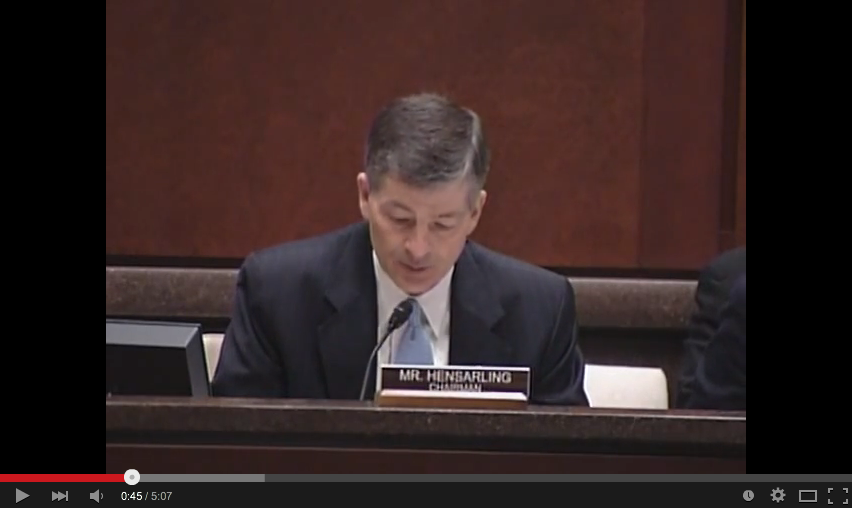Hensarling Opening Statement at Bipartisan Regulatory Relief Markup11 bipartisan bills designed “to promote a healthier economy, preserve consumer choice and help our fellow Americans achieve the American dream of financial independence”
Washington,
March 25, 2015
The committee meets this morning to consider 11 bipartisan bills that are designed to promote a healthier economy, preserve consumer choice and help our fellow Americans achieve the American dream of financial independence. These bills – all of them, again, sponsored and co-sponsored by Republicans and Democrats alike – either passed the House or this committee during the previous Congress. In fact, 9 of these 11 bills we will consider today passed the House or this committee without any opposing vote at all. In other words, no Member voted against them. So it is difficult, perhaps even impossible, to be more bipartisan or less controversial than these 11 bills that we consider today. Which means because they are bipartisan, they are modest. Although they are modest, they are not insignificant to our fellow citizens back home or to the community banks and credits unions that our fellow citizens depend on. Witness after witness has come before our committee over the last several years to speak about the weight, the volume, the complexity, the cost and uncertainty of Washington regulations. One community banker who appeared before our committee last week called this “an avalanche of new rules.” It is not an exaggeration to say that America’s community financial institutions are withering on the vine. Our nation is now losing, regrettably, on average more than one community financial institution a day and they are not perishing from a natural death. We certainly care about the financial institutions that are being harmed but why we are engaged in this activity --our real concern is because we care about the customers of these financial institutions even more. Every time a community bank or credit union dies, so, too, do the dreams of many of our fellow citizens – hardworking taxpayers – who rely upon their hometown banks and credit unions to perhaps buy a pickup truck in order to go to work. Maybe they’re helping fund their very first child in their family’s history to go to college or to start a small business that they have labored so many years to finally begin. So I want to thank my colleagues on both sides of the aisle today who have worked hard and worked together on needed and sensible bills that are before us. Again, I want to reinstitute my invitation to all Members to engage in this bipartisan effort to provide regulatory relief for the financial institutions funding the American dreams of our citizens. Any member who brings forward a legitimate, bipartisan piece of regulatory relief legislation for our community financial institutions will find me ready to work with them to markup the bill and to send it to the House floor. Again, I hope we can continue to work together and find common ground as we’ve done with these 11 bipartisan bills today. And this is exactly what we’ll be doing as well with our bipartisan Task Force to Investigate Terrorism Financing. Republicans and Democrats alike on this committee are committed to making sure that our nation is doing everything possible to stop terrorists from using the global financial system to finance their acts of evil. Fighting the financial war against terror demands constant innovation and vigilance. I’m very pleased that so many members on both sides of the aisle have expressed a serious interest in working together to examine what, if any, changes are needed to upgrade, amend, or improve our nation’s ability to starve the terrorists of the money they need to carry out their attacks. I thank our colleagues Mr. Fitzpatrick and Mr. Pittenger for agreeing to serve as Chairman and Co-Chairman of the Task Force, and I thank Mr. Lynch for agreeing to serve as the Ranking Member of the Task Force. |


